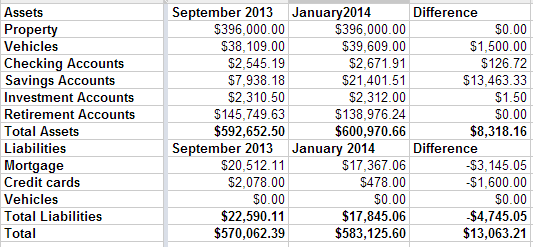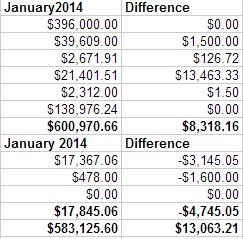- Crap. Replacing the power jack on my laptop means ordering out for the piece. #
- @mymoneyshrugged Engraved pocket knives were a hit with my groomsmen. in reply to mymoneyshrugged #
- Movies that force previews suck. Dangit, Invention of Lying. #
- RT @Lynnae Carnival of Personal Finance #148 http://bit.ly/adRZQo #
- @jimmyjohns – 35 minutes is not "so fast I'll freak". #
- @jimmyjohns "Can you send the store info to bit.ly/jjfeedback? Thx!" – Done. Normally service is excellent. in reply to jimmyjohns #
- Pizzeria with the family. Yum! #
- RT @FrugalYankee: Fact: In 1873, there were 4131 beer breweries pumping in the US. 1973 only 41 brewers operating 89 plants. Now around 1500 #
- Mango pudding is the king of all nummy. #
ING Direct – 2 Day Sale
Today and tomorrow, ING Direct is having a “Financial Independence Days Sale”.
It’s a good sale. If you open a checking account or Sharebuilder account and you’ll get $76. Apply for a mortgage and you’ll get $776 off of the closing costs.
I have accounts at 4 different banks. Two of those were opened for specific debt-reduction purposes. Of the others, one is used for most of my cash flow and bill payments, and the other is ING. As of this moment, I have 15 accounts or sub-accounts with ING Direct.
Opening an account is painless and only takes a few minutes. They are currently offering up to 1.25% in an interest-bearing checking account, though I’ve never qualified for more than .25%. That account comes with overdraft protection, so you are charged interest instead of overdraft fees.
Once you have your first account set up, sub-accounts can be created in literally seconds. Why would you want a bunch of sub-accounts? I have a number of saving goals. Each of these goals has its own account at ING. I can tell at a glance how much we have saved for our vacation next month and far away we are from affording my son’s braces. My kids each have an account here because, currently, the interest rate is at 1.1%, which is miles ahead of most traditional banks. Combined with the convenience of total online control, there’s no contest.
Money transfers are smooth. I use one of my accounts as a transfer account to get money to and from two separate banks.
I also have a Sharebuilder account. For those who aren’t familiar with it, it is a stock brokerage with low fees and a low barrier to entry. If you set up an automatic investment, you get $4 stock trades with no minimum. I’m not aware of any place cheaper.
That all sounds like a lot of ad copy and the links are affiliate links, but the truth is, I am just that happy with ING. I’ve never had an accounting error, or any problems at all.
The downside? Paper checks are verboten. They will not accept paper checks, but you do have a check card to use. You can hit 35,000 ATMS for free withdrawals, but any deposits are held for a few days before you have access to the funds. It can also take 3-4 days to transfer money from ING to another bank. I keep enough in the accounts that I’m always spending or transferring older deposits while I wait for the new ones to clear.
Even if you don’t like the bank, get a checking account, use it a few times and get $76 for very little trouble. Open a Sharebuilder account, buy some stock and collect $76 for it. Without an automatic payment, it will cost you less than $20 to buy, then sell the stock, netting you $56.
Who doesn’t like free money?
Net Worth Update
Now that my taxes are done and paid for, I thought it would be nice to update my net worth.
In January, I had:
Assets
- House: $252,900
- Cars: $20,789
- Checking accounts: $3,220
- Savings accounts: $6,254
- CDs: $1,105
- IRAs: $12,001
- Investment Accounts: $1,155
- Total: $297,424
Liabilities
- Mortgage: $29,982
- Credit card: $18,725
- Total: $48,707
Overall: $249,717.00
Here is my current status:
Assets
- House: $240,100 (-12,800) Estimated market value according to the county tax assessor. This will be going down in a few months when the estimates are finalized for the year. I don’t care much about this number. We’re not moving any time soon, so the lower the value, the lower the tax assessment.
- Cars: $15,857 (-4,932) Kelly Blue Book suggested retail value for both of our vehicles and my motorcycle.
- Checking accounts: $4,817 (+1,597) I have accounts spread across three banks. I don’t keep much operating cash here, so this fluctuates based on how far away my next paycheck is.
- Savings accounts: $6,418 (+164) I have savings accounts spread across a few banks. This does not include my kids’ accounts, even though they are in my name. This includes every savings goal I have at the moment. I swept a chunk of this into an IRA to lower my tax bill, which is also why my IRA balance is up as much as it is.
- CDs: $1,107 (+2) I consider this a part of my emergency fund.
- IRAs: $16,398 (+4,397) I have finally started to contribute automatically. It’s only $200 at the moment, but it’s something.
- Investment Accounts: $308 (-847) I pulled most of this out and threw it at a credit card.
- Total: $285,005 (-12,419)
Liabilities
- Mortgage: $28,162 (-1,820)
- Credit card: $16,038 (-2,687) This is the current target of my debt snowball. This has actually grown a bit over the last week. I did a balance transfer that cost $400, but it gives me 0% for a year, versus the 9% I was paying. That will pay for itself in 3 months, while simplifying my payments a bit and saving me almost a thousand dollars in payments this year.
- Total: $44,200 (-4,507)
Overall: $240,805 (-8,912)
Well, I lost some net worth over the last quarter, but it’s still a good report. If I disregard the change in value of my house and cars–two thing I have no control over–my overall total would have gone up almost $9,000.
All in all, it’s been a good year for me, so far, though paying off that credit card by fall is going to be a challenge.
My Credit Cards
This announcement is a bit premature, but not everything that’s premature has to end in an evening of disappointment.
At the beginning of the year, I transferred the balance of my last credit card onto two different cards, each with a 0% interest rate. One card got a $4,000 transfer and the other got $13,850. The approximately $415 in fees I paid for the transfer saved me nearly $1500 in interest this year.
The card that got the big balance is the card we use for a lot of our daily spending. On my statement dated 2/18/2012, the balance on the this card was $14,865.23. At the same time, the smaller card had a balance of $3,925.09, for a total of $18,790.32. When I started my debt-murder journey in April 2009, it had peaked at just under $30,000.
When my payments clear later today, that balance will be gone.
That is nearly $19,000 paid down in 8 months.
Now, the inheritance we picked up did accelerate our repayment a bit, but only by a few months.
Starting from $90,394.70 in April 2009, we have paid down $63,746.70, leaving $26,648.00 on our mortgage.
I’m more than a little excited, which–as usual–is the cause for the prematurity.
New goal: pay off the mortgage in 2013.
Net Worth Update – January 2014
This may be the most boring type of post I write, but it’s important to me to track my net worth so I can see my progress. We are sliding smoothly from debt payoff mode to wealth building mode.
Our highlights right now are nothing to speak of. We did let our credit card grow a little bit over the last couple of months, but paid it off completely at the end of December. It grew mostly as a matter of not paying attention while we were doing our holiday shopping and dealing with some car repairs.
That’s it. We haven’t remodeled our bathrooms yet, but we have the money sitting in a savings account, waiting for the contractor. We haven’t bought a pony yet, but we did decide that a hobby farm wouldn’t be the right move for us. We’ll be boarding the pony instead of moving, at least for the foreseeable future.
Our net worth is up $13,000 since September. Our savings are up and our retirement accounts are down because there are two inherited IRAs that we need to slowly cash out and convert to regular IRAs.

Refinancing Your Existing Loan to Purchase An Investment Property
Many people are looking at the housing market slump right now as an investment opportunity. Here are a few of the things that you need to know before getting a new home loan or refinancing your existing loan in order to make that happen.
Amount You Want to Borrow
A lot of borrowers go shopping for real estate and have exactly no idea how much money they can borrow. One of the first questions that you need to ask before going real estate hunting is how much can I borrow. You can ask a bank, lender, or financial institution to give you a ballpark figure of the amount of loan that you would qualify for. This will make it easier for you to narrow down exactly what type of property you can afford and what areas you can concentrate on.
Amount of Interest You Will Pay
Too many people are overly concerned with the purchase price of the home that they are buying. They fail to find out how much interest they will have to pay back to the bank in order to make their home ownership dreams come true. This is where a home loan calculator can be really useful. You can find out exactly how much interest you will repay over a 10, 20, or 30 year loan time period. You can also change the interest rate and down payment amount on those calculators to see if you can secure a lower monthly payment.
Credit Score Needed to Qualify
It doesn’t matter if you are buying a home for the first time or refinancing an existing loan. Your credit score matters. You need to start doing some research now if you want to secure a loan with a really low interest rate. This involves taking the time to see what credit scores traditional lenders are looking for and doing the work necessary to qualify for this loan. Your credit score will make a big difference in determining if an investment property purchase is a profitable endeavor or one that winds up costing you money. It will depend heavily on what kind of loan your credit score allowed you to negotiate.
Make the Choice
Once you know how much you will need and exactly how much you will be paying out over the life of another mortgage, you can decide whether you want to refinance your current home loan to get another one. Adding on another huge debt to an existing one is a big risk. Make sure to think it through fully before jumping in.




